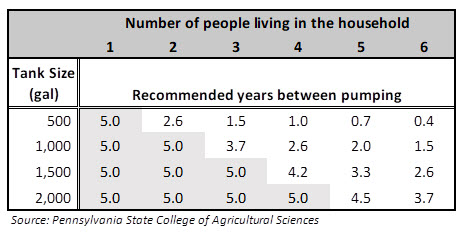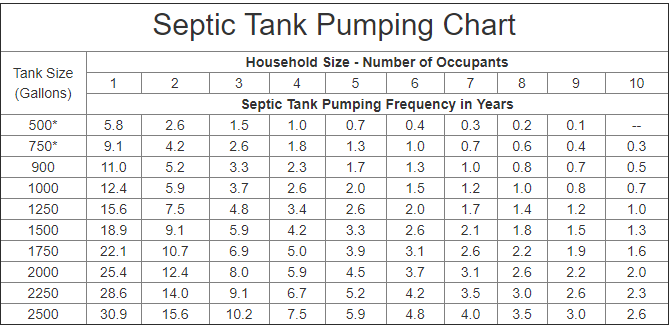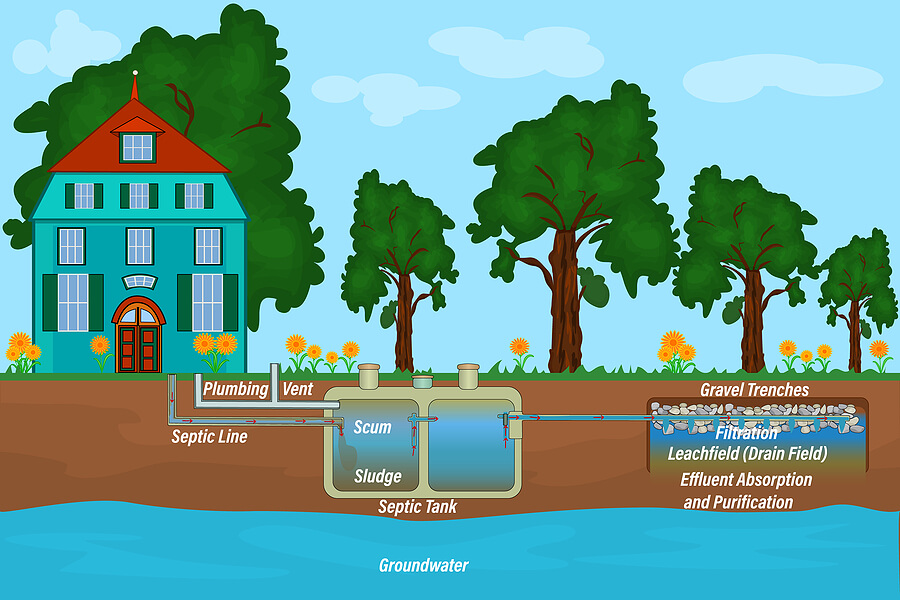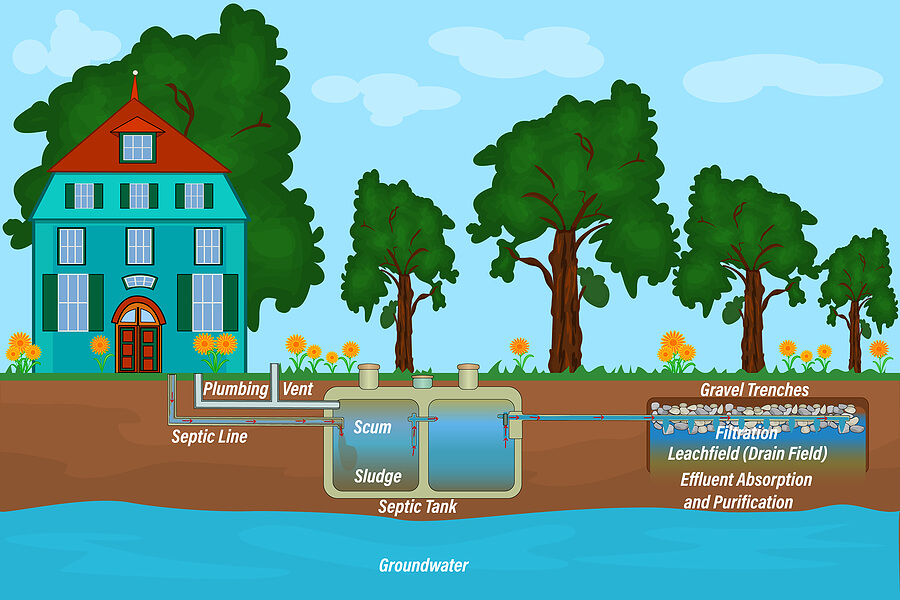In this article, you will learn about how often septic tanks need to be cleaned and the factors that can influence the frequency of maintenance. Septic tanks are an essential component of any home that is not connected to a municipal sewer system. Maintaining a properly functioning septic system is crucial to prevent backups, odors, and costly repairs.
The frequency at which septic tanks need to be cleaned can vary depending on several factors. The size of the tank, the number of people living in the house, and the amount of wastewater generated all play a role in determining the maintenance schedule. Additionally, the type of household waste that goes into the septic system, such as the use of garbage disposals or excessive use of cleaning products, can also impact the frequency of cleaning. By understanding these factors, you can ensure that your septic tank is cleaned and maintained at the appropriate intervals to keep your system running smoothly and avoid any potential issues.
Understanding the basic functioning of septic tanks
Septic tanks play a crucial role in the wastewater treatment process for households that are not connected to a centralized sewage system. These tanks are designed to collect, treat, and dispose of the wastewater generated from your home. Understanding the basic functioning of septic tanks is essential for maintaining their efficiency and preventing costly repairs.
The role of septic tanks in wastewater treatment
Septic tanks are underground structures that are typically made of concrete, fiberglass, or plastic. They are divided into two chambers, which are responsible for separating solids from liquids in the wastewater. When wastewater flows into the septic tank, solids and heavier particles settle at the bottom, forming a layer of sludge. Lighter particles and liquids float to the top, forming a layer of scum. In between these layers, the liquid portion of the wastewater is treated.
The septic tank is designed in such a way that the liquid portion, also known as effluent, slowly leaves the tank and enters the drain field. The drain field consists of a network of perforated pipes buried in the ground. These pipes distribute the effluent into the soil, where further treatment occurs naturally through filtration and microbial activity.
Components and structure of a septic tank system
A septic tank system consists of several components that work together to ensure the proper treatment and disposal of wastewater. Apart from the septic tank itself, there are inlet and outlet pipes, a baffle, and a drain field.
The inlet pipe is responsible for carrying wastewater from your home into the septic tank, while the outlet pipe allows the treated effluent to exit the tank and enter the drain field. The baffle, typically a T-shaped pipe, helps prevent the scum layer from flowing out of the tank and into the drain field.
The drain field, as mentioned earlier, is a crucial component of the septic system. It consists of a network of pipes with holes or slots that allow the effluent to be distributed evenly into the surrounding soil. The soil acts as a natural filter, removing any remaining impurities before the water eventually reenters the groundwater.
Importance of proper maintenance for septic tanks
Proper maintenance is essential for the efficient and effective functioning of septic tanks. Neglecting regular maintenance can lead to a buildup of solids, clogs, and blockages, which can impair the system’s performance and cause backups in your plumbing fixtures. In addition to these issues, neglecting septic tank cleaning can also result in unpleasant odors, health hazards, and even complete system failure.
Regular septic tank cleaning helps prevent the accumulation of solid waste and sludge, ensuring that the tank continues to function properly. Cleaning the tank also allows for the early detection of any potential issues, such as cracks or leaks, which can be addressed before they escalate into costly repairs.
Factors influencing the frequency of septic tank cleaning
The frequency at which you should clean your septic tank depends on several factors. Understanding these factors will help you determine how often your specific septic system needs to be cleaned and maintained.
Household size and water usage
The size of your household and the amount of water you use on a daily basis play a significant role in determining the frequency of septic tank cleaning. Larger households with more residents tend to produce more wastewater, resulting in a higher accumulation of solids in the septic tank. Similarly, households with excessive water usage, such as multiple loads of laundry per day or excessively long showers, may require more frequent cleanings to prevent overloading the system.
Volume and capacity of the septic tank
The size and capacity of your septic tank are crucial factors in determining how often it needs to be cleaned. Larger tanks can hold more wastewater and solids, allowing for longer intervals between cleanings. Conversely, smaller tanks with limited capacity may require more frequent cleanings to maintain optimal performance.
Type and efficiency of the septic system
Different types of septic systems employ various treatment methods and technologies, which can influence the frequency of cleaning. Traditional gravity systems, aerobic systems, and advanced treatment systems all have different maintenance requirements.
Gravity systems are the most common type of septic system. They rely on natural processes and gravity to move wastewater through the system. These systems typically require regular pumping and cleaning every three to five years.
Aerobic systems introduce oxygen into the septic tank, promoting the growth of beneficial bacteria that break down solids more efficiently. These systems may require cleaning less frequently, usually every three to seven years.
Advanced treatment systems, such as sand filters or mound systems, employ additional layers of filtration and treatment. These systems often require more frequent maintenance, typically every one to three years.
Quality and type of waste entering the septic tank
The quality and type of waste that enters your septic tank can impact the frequency of cleaning. Certain substances, such as chemicals, grease, oils, and non-biodegradable materials, can hinder the natural degradation process and lead to the accumulation of solids. To maintain the efficiency of your septic system, it is important to avoid disposing of harmful substances down the drain and to properly dispose of non-biodegradable waste.
Presence of garbage disposals and other waste-grinding appliances
Garbage disposals and waste-grinding appliances can increase the load on your septic system by introducing additional solids and organic matter. These appliances are known to generate more waste that needs to be broken down and treated. If you have a garbage disposal or other waste-grinding appliances, you may need to clean your septic tank more frequently to prevent a buildup of solids.

Effects of neglecting septic tank cleaning
Neglecting septic tank cleaning can have several detrimental effects on the overall performance and longevity of your septic system. It is crucial to be aware of these effects to understand the importance of regular maintenance and cleaning.
Accumulation of solid waste and sludge
When a septic tank is not regularly cleaned, solid waste and sludge can accumulate at the bottom of the tank. Over time, this buildup can reduce the effective capacity of the tank, potentially leading to overflows or backups in your plumbing fixtures. An excessive accumulation of solids can also increase the load on the drain field, causing it to become clogged and fail.
Buildup of clogs and blockages
Neglected septic tanks are prone to clogs and blockages in the pipes and drain field. These blockages can impede the flow of wastewater, leading to slow-moving drains, toilets, and sinks. A blockage in the drain field can cause effluent to back up into the tank or even surface in your yard, resulting in costly repairs and health hazards.
Decreased efficiency of the septic system
As solid waste and sludge accumulate in the septic tank, the efficiency of the system decreases. The accumulation can interfere with the separation process, preventing the proper treatment of wastewater. This can result in higher levels of contaminants entering the drain field and the surrounding soil, potentially contaminating groundwater and nearby ecosystems.
Odor issues and potential health hazards
A neglected septic tank often emanates foul odors, especially when the solids and sludge begin to decompose. These odors can permeate your home and yard, causing discomfort and potential health hazards. In addition to the unpleasant odor, a neglected septic tank can also attract pests and insects, further compromising your health and hygiene.
Costly repairs and system failure
Failure to regularly clean and maintain your septic tank can eventually lead to system failure. When the septic system fails, it can result in costly repairs, such as replacing the tank or reestablishing the drain field. These repairs can be significantly more expensive than regular maintenance and cleaning, highlighting the importance of proactive measures to prevent system failure.

Signs that indicate the need for septic tank cleaning
To ensure the optimum performance of your septic system, it is crucial to be aware of the signs that indicate the need for septic tank cleaning. Recognizing these signs early can help you take prompt action and prevent further damage to your septic system.
Slow draining sinks, toilets, and drains
If you notice that your sinks, toilets, and drains are draining slower than usual, it may be an indication that your septic tank needs to be cleaned. A buildup of solids and sludge can impede the flow of wastewater, causing slow drainage throughout your house.
Foul odor emanating from drains or the yard
A foul odor, similar to the smell of rotten eggs, is a common sign of a neglected septic tank. If you notice a persistent odor coming from your drains or your yard, it is likely that your septic tank needs cleaning. Ignoring this sign can lead to further complications and potential health risks.
Pooling water or wet spots near the septic system
Poolin


